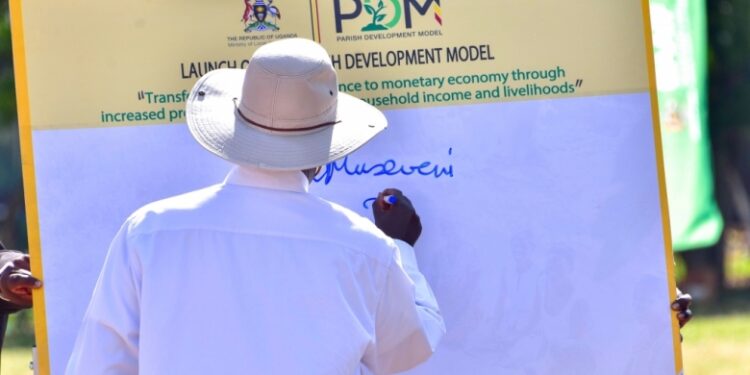In February this year, President Yoweri Museveni launched Parish Development Model (PDM).
The Shs490 billion project is meant to eradicate poverty through the execution of development activities at the parishes.
It is also aimed at deepening the decentralization process by; improving household incomes; enabling inclusive, sustainable, balanced and equitable socio-economic transformation; and increasing accountability at local levels.
During its launch, the minister of Local Government, Raphael Magyezi promised that some of the money will be released at the start of the current Financial Year. However, in July, Minister Magyezi informed the nation that the government was to delay the release of the first batch of the PDM funds due to delays in forming savings groups and associations across the country.
“Currently, the formation of Saccos stands at 83 per cent and we are still forming more of them. This means that we shall not release the first batch of the money as planned, but it will delay. We first want to complete the formation of these groups in all the parishes, orient them and then after that, we shall release the money,” said Minister Magyezi in July.
Nevertheless, according to different reports by civil societies, there are still many issues that could hinder the government to meet its goal through PDM among them including the unpreparedness of the beneficiaries at the parish level and implementers at the national level.
While speaking on Tuesday at the national conference of the Financial Year 2023/2024, Julius Mukunda, the Executive Director, Civil Society Budget Advocacy Group (CSBAG) asked the Prime Minister Robinah Nabbanja not to release any money for PDM until the beneficiaries are sensitized and know what to do.
“I want to thank the Ministry of Finance for delaying the full implementation of the Parish Development Model because a lot of resources were going to be wasted for nothing. A small rapid assessment revealed that the Parish Development committee were not yet prepared to receive funds, a negative mindset about PDM in communities. In fact, most people look at PDM money as an appreciation from Government,” he said.
Mr. Mukunda added that there is also a lack of beneficiary involvement in the selection of the PDM commodity. “We look forward to ensuring that government fully addresses some of these problems especially ensuring that we only use data from UBOS while sensitizing the masses and ensure that ministries and agencies at the national level are well coordinated.”
Dr. Arthur Bainomugisha, the Executive Director of Advocates Coalition for Development and Environment (ACODE) also added that government must involve civil societies at every level to promote transparency and accountability.
“Involving civil societies in the implementation of the PDM will also help in mindset change. The initiative of mindset change must not only stop at the parish levels but also at the national levels because some of us need to shift or change in the mindset to be able to implement such a program intended to change lives from poverty,” he said.
Since the latest figures from the Uganda Bureau of Statistics show that 39 per cent of Ugandans are still in a subsistence economy, the PDM is thriving on seven pillars including (a) production, storage, processing and marketing; (b) Infrastructure and economic services; (c) financial inclusion; (d) social services; (e) mindset change; (f) parish-based management information system (g) governance and administration.
Although parish chiefs are the principal signatories to the bank accounts of all the groups in each parish and are also the chief coordinators, some parishes still lack parish chiefs.
Do you have a story in your community or an opinion to share with us: Email us at editorial@watchdoguganda.com












